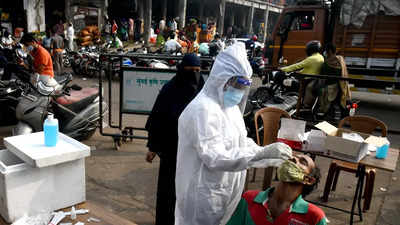- News
- India News
- Covid-19: RAT, self-kit tests helps in early detection; backbone of testing amid surge, says Balram Bhargava
Trending
This story is from January 13, 2022
Covid-19: RAT, self-kit tests helps in early detection; backbone of testing amid surge, says Balram Bhargava
Commonly used lateral flow tests such as rapid-antigen tests (RAT) and home-antigen tests (HAT) helps in early detection of Covid-19 from the third day to the eighth day – when the viral load is maximum - from start of the infection and have, therefore, become the backbone of testing during the present surge powered by Omicron, the Indian Council of Medical Research (ICMR) Director General Balram Bhargava said.

NEW DELHI: Commonly used lateral flow tests such as rapid-antigen tests (RAT) and home-antigen tests (HAT) helps in early detection of Covid-19 from the third day to the eighth day – when the viral load is maximum - from start of the infection and have, therefore, become the backbone of testing during the present surge powered by Omicron, the Indian Council of Medical Research (ICMR) Director General Balram Bhargava said.
However, RT-PCR tests – which were considered the gold standard tests during the previous surges - can detect certain non-infective RNA particles even after the eighth day, leading to positive results.
Primarily, the six-day period (from the third day to the eighth day since exposure) is the ‘infectious period’ and that is also the reason why the discharge policy and isolation policy are focused on discharge after seven days, Bhargava said.
Underlining that there are adequate testing kits and capacities available in the country, Bhargava said the total production capacity of RT-PCR and RAT kits currently stands at 1.5 crore a day. Besides, 18 lakh home antigen testing kits can be produced daily.
Bhargava said that according to government advisory, high-risk contacts of confirmed Covid cases, identified based on age or comorbidities, those undertaking inter-state travel do not need to get tested.
Also, asymptomatic individuals in community settings, patients who stand discharged according to home-isolation guidelines and those being discharged from a Covid-19 facility under the revised discharge policy do not need to get tested, he said.
However, Bhargava stressed on seven-day home quarantine for all contacts of any positive case according to the guidelines and added that they should continue to wear a mask.
Referring to the Advisory on Purposive Testing Strategy for Covid-19 in India issued by ICMR recently, he said symptomatic individuals, even if they test negative on a home test or rapid-antigen test should go for RT-PCR test.
According to the advisory, testing can be undertaken either through RT-PCR, TrueNat, CBNAAT, CRISPR, RT-LAMP, Rapid Molecular Testing Systems or through the rapid-antigen test.
A positive point-of-care test and molecular test is to be considered confirmatory, without any repeat testing. Symptomatic individuals, testing negative on home/self-test or rapid-antigen test should undertake RT-PCR test, the advisory stated.
In community settings, symptomatic individuals, at-risk contacts (elderly and individuals with comorbidity) of laboratory-confirmed cases may be tested.
Also, individuals undertaking international travel may be tested.
In hospital settings, testing may be undertaken as per the discretion of the doctor with considerations such as no emergency procedure should be delayed for lack of a test and patients should not be referred to other facilities for lack of a testing facility, the advisory stated.
All arrangements should be made to collect and transfer samples to testing facilities, mapped to the health facility.

However, RT-PCR tests – which were considered the gold standard tests during the previous surges - can detect certain non-infective RNA particles even after the eighth day, leading to positive results.
Primarily, the six-day period (from the third day to the eighth day since exposure) is the ‘infectious period’ and that is also the reason why the discharge policy and isolation policy are focused on discharge after seven days, Bhargava said.
Underlining that there are adequate testing kits and capacities available in the country, Bhargava said the total production capacity of RT-PCR and RAT kits currently stands at 1.5 crore a day. Besides, 18 lakh home antigen testing kits can be produced daily.
The daily RT-PCR testing capacity stands at more than 20 lakh samples.
Bhargava said that according to government advisory, high-risk contacts of confirmed Covid cases, identified based on age or comorbidities, those undertaking inter-state travel do not need to get tested.
Also, asymptomatic individuals in community settings, patients who stand discharged according to home-isolation guidelines and those being discharged from a Covid-19 facility under the revised discharge policy do not need to get tested, he said.
However, Bhargava stressed on seven-day home quarantine for all contacts of any positive case according to the guidelines and added that they should continue to wear a mask.
Referring to the Advisory on Purposive Testing Strategy for Covid-19 in India issued by ICMR recently, he said symptomatic individuals, even if they test negative on a home test or rapid-antigen test should go for RT-PCR test.
According to the advisory, testing can be undertaken either through RT-PCR, TrueNat, CBNAAT, CRISPR, RT-LAMP, Rapid Molecular Testing Systems or through the rapid-antigen test.
A positive point-of-care test and molecular test is to be considered confirmatory, without any repeat testing. Symptomatic individuals, testing negative on home/self-test or rapid-antigen test should undertake RT-PCR test, the advisory stated.
In community settings, symptomatic individuals, at-risk contacts (elderly and individuals with comorbidity) of laboratory-confirmed cases may be tested.
Also, individuals undertaking international travel may be tested.
In hospital settings, testing may be undertaken as per the discretion of the doctor with considerations such as no emergency procedure should be delayed for lack of a test and patients should not be referred to other facilities for lack of a testing facility, the advisory stated.
All arrangements should be made to collect and transfer samples to testing facilities, mapped to the health facility.
End of Article
FOLLOW US ON SOCIAL MEDIA










